أخبار وأحداث
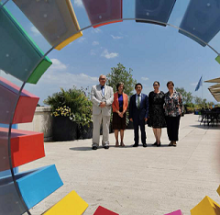
The JIU is pleased to announce that the findings and conclusions of the review of Management and administration in the FAO were presented by Inspector Carolina Maria Fernández Opazo at the FAO Finance Committee on May 23rd 2024.
The Joint Inspection Unit (JIU) is pleased to announce that the findings and conclusions of the review of Management and administration in the Food and Agriculture Organization of the United Nations (FAO) were presented by Inspector Carolina Maria Fernández Opazo at the FAO Finance Committee on May 23rd 2024. The relevant interaction lasted 3 hours and was structured as follows:
i. Presentation by JIU of the FAO-MAR;
ii. Presentation by FAO of management response to JIU report;
iii. Questions and answers by Finance Committee members;
iv. Second round of questions and answers; and
v. Discussion and acceptance of text regarding JIU FAO-MAR and management response for inclusion in Finance Committee draft report.

JIU presents the management and administration review of FAO during FAO’s 199th Session of the Finance Committee and the 175th Session of the Council
The Joint Inspection Unit is pleased to announce that the findings and conclusions of the review of management and administration in the Food and Agriculture Organization of the United Nations (FAO) will be presented by Inspector Carolina Fernández Opazo at the FAO Finance Committee and the Council on May 23rd and June 13th, respectively. The presentations to the FAO’s governing bodies aim at fostering transparency, informed decision-making, efficient resource allocation, and accountability within the scope of FAO’s governance.

Review of the quality, effectiveness, efficiency and sustainability of health insurance schemes in the United Nations system organizations – JIU/REP/2023/9
The Joint Inspection Unit is pleased to announce the release of its report on health insurance schemes for active and retired staff in the United Nations system organizations, prepared by Inspector Jesús S. Miranda-Hita. This topic was last covered by the JIU in 2007.
Health insurance is an essential part of the compensation package provided to the international organizations. While it is part of the obligation of the organizations to establish a social security scheme for their staff, retirees and families, the review found that in all cases except one, governing bodies and legislative organs have played a very limited role in health insurance policymaking, which has resulted in the existence of 26 different health insurance schemes in the 28 JIU participating organizations with different coverage and benefits.

Review of the use of non-staff personnel and related contractual modalities in the United Nations system organizations - JIU/REP/2023/8
The Joint Inspection Unit is pleased to announce the release of its report on the use of non-staff personnel and related contractual modalities in the United Nations system organizations, prepared by Inspectors Seyoum and Goitsemang. This topic was last covered by JIU in 2014.
While many of the United Nations system organizations have developed policies and contractual modalities to guide them in the use of non-staff personnel, the review highlights the absence of a common system-wide nomenclature for and definition of non-staff personnel. Furthermore, the employment relationship principle is not fully observed as a criterion for determining staff and non-staff contractual modalities, often resulting in the misuse of non-staff personnel.

Flexible working arrangements in the United Nations system organizations - JIU/REP/2023/6
The Joint Inspection Unit is pleased to share the Review Highlights and Full Report for the Review of Flexible working arrangements in the United Nations system organizations prepared by Inspector Victor Moraru.
Prior to the global health emergency, only a fraction of United Nations personnel took advantage of flexible working arrangements (FWA). The COVID-19 pandemic experience and lessons learned accelerated the reassessment of FWA in the United Nations system. According to the information provided by the JIU participating organizations, the destigmatization of flexible working arrangements, the digital technology enabling teleworking and the cultural shift towards work flexibility have led to significant increased interest on the part of United Nations personnel in the use of FWA post-pandemic, as well as to higher levels of acceptance by managers and teams, in particular of teleworking modalities.

JIU/REP/2023/2 (ILO Training Center)
At ILO Training Center, Inspectors Roscher and Miranda-Hita present JIU findings and recommendations on the internal pre-tribunal-stage appeal mechanisms available to staff of the United Nations system organizations
Following the issuance of their report, Inspectors Roscher and Miranda-Hita were invited by the ILO training center (Turin) to discuss the findings and recommendations for managing employment disputes effectively in international organizations.

JIU issues report on the internal pre-tribunal-stage appeal mechanisms available to staff of the United Nations system organizations
The Joint Inspection Unit is pleased to announce the release of its report on the internal pre-tribunal stage appeal mechanisms available to staff of the United Nations system organizations prepared by Inspectors Gönke Roscher and Jesús S. Miranda Hita.

JIU issues first report on mental health and well-being within the UN system
The Joint Inspection Unit is pleased to announce the release of its report on mental health and well-being policies and practices within the United Nations system prepared by Inspectors Eileen A. Cronin and Keiko Kamioka. The review, the first to comprehensively cover the topic of mental health and well-being, is timely considering the adjustments that participating organizations implemented during the pandemic as well as the conclusion of the first phase of the implementation of the UN System Mental Health and Well-being strategy.
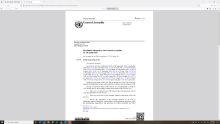
General Assembly resolution on JIU - A/RES/77/279
On the 18th of April 2023, the United Nations General Assembly adopted its annual Resolution concerning the work of the Joint Inspection Unit (A/RES/77/279). In the first part of the resolution, the UNGA reaffirms the mandate of the Unit as the only independent external oversight-body of the United Nations system and reiterates the importance of its evaluations and inspections for the identification of specific management, administrative and programmatic issues withing its participating organizations.

JIU concludes self-assessment exercise
In 2022, the Unit completed a comprehensive self-assessment exercise under the terms of reference and the benchmark framework developed for that purpose in 2021 and the first part of 2022. The aim of the self-assessment was to propose improvements to the Unit’s work in line with an assessment of the current situation from both a strategic and an operational perspective and to consider the evolution in that regard since the previous self-evaluation, which was held in 2013. This internal exercise covered several areas.

Review of measures and mechanisms for addressing racism and racial discrimination in the UN system organizations - JIU/NOTE/2022/1/Rev.1
The Joint Inspection Unit of the United Nations system (JIU) is pleased to share the Review Highlights and Full Report for the Review of measures and mechanisms for addressing racism and racial discrimination in United Nations system organizations: managing for achieving organizational effectiveness, prepared by Inspector Sukai Prom-Jackson.
What are the next steps to initiate to improve and to advance ongoing work to address racism and racial discrimination? What are the reflections and actions that need to be taken for transformative changes in addressing racism and racial discrimination, in view of global changes and challenges and the imperatives of a world characterized as volatile, uncertain, complex and ambiguous?

The Joint Inspection Unit of the United Nations system elects its Chair and Vice-Chair for 2023 and adopts its programme of work
The Joint Inspection Unit (JIU) concluded the second part of its Winter Session on 10 January 2023. In the first part of the Winter Session, the Inspectors elected Inspector Eileen A. Cronin (United States) as Chair and Inspector Carolina Fernandez-Opazo (Mexico) as Vice-Chair of the Unit for 2023. The Unit also adopted its programme of work for 2023, which includes 1 system-wide review and the reviews of management and administration of two of its participating organizations. The programme of work will be presented to the General Assembly at its first resumed seventy-seventh session this year.
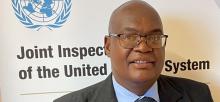
Interview of Inspector Goitsemang (Botswana)
Please say a few words about "who you were" in your professional life before joining the JIU?
I think it would be apt to say that I am a ‘career diplomat’, having served in the Ministry of Foreign Affairs of the Republic of Botswana for a continuous period of 25 years. I have held various leadership positions in the Ministry of Foreign Affairs, five years of which I was the Executive Head (Permanent Secretary) of the Ministry. As a diplomat, I have had an opportunity to serve abroad at the Botswana Diplomatic Missions in Sweden, Zambia and Nigeria. I am also well versed with the workings of the United Nations, having attended the UN General Assembly Sessions on various occasions. Some of the special assignments I have undertaken, include the setting-up of the Botswana Diplomatic Missions in Nigeria (2007) and Kuwait (2010), as well as the setting-up of the new Ministry of Justice in May 2022.

Review of management and administration in the United Nations Human Settlements Programme (UN-Habitat) (JIU/REP/2022/1)
The overall objective of the present review is to provide an independent assessment of the management and administration in UN-Habitat, focusing, inter alia, on (a) the recent governance reform; (b) financial management; (c) organizational restructuring and management; and (d) oversight and evaluation.
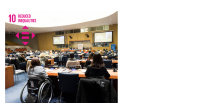
JIU report gets the support of the ACABQ and the General Assembly in a significant step forward in enhancing accessibility for persons with disabilities to conferences and meetings of the United Nations system
Date: 10 August 2022
On 29th June, a new resolution (A/RES/76/273) was adopted by the General Assembly in relation to the Joint Inspection Unit (JIU) report on enhancing accessibility for persons with disabilities to conferences and meetings of the United Nations system (JIU/REP/2018/6). Following the publication of the JIU report in early 2019, the momentum for action has been increasing throughout the United Nations system. In particular, the report has resonated well with the Advisory Committee on Administrative and Budgetary Questions (ACABQ) and the General Assembly.

Business continuity management in United Nations system organizations (JIU/REP/2021/6)
Business continuity is defined as the capability of an organization to continue delivery of essential and time-critical services at acceptable predefined levels during and/or following a disruptive incident. The United Nations system organizations often operate in volatile environments and can be exposed to disruptions due to natural and human-made disasters. Moreover, the current COVID-19 pandemic has seriously tested business continuity management and organizational resilience. Yet, the pandemic also provided an opportunity to gain from good practices and early lessons learned and to strengthen business continuity management. Without an effective business continuity management framework, organizations run the risk of incoherent and uncoordinated responses, thereby amplifying crises and degrading organizational resilience.
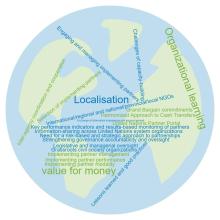
Review of the management of implementing partners in United Nations system organizations (JIU/REP/2021/4)
The follow-up review of the management of implementing partners by organizations of the United Nations system assesses the progress achieved since the previous JIU report JIU/REP/2013/4. It takes appropriate account of the impact of COVID-19 as it relates directly to the engagement and management of implementing partners. Based on recent trends and developments, it looks ahead as to how the implementing partner modality and management could evolve in the coming years. It also draws up an illustrative list of good practices from United Nations entities.
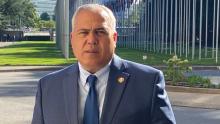
Farewell to Inspector Flores Callejas
In December 2021, the Joint Inspection Unit bid farewell to Inspector Jorge Flores Callejas, who departed after serving the Unit for two five-year terms. As an Inspector, he has issued nine system-wide reports and notes covering topics such as cybersecurity, enterprise resource planning, cloud computing, south-south and triangular cooperation, safety and security, climate change and procurement. He also coordinated management and administration reviews of JIU participating organizations such as the Economic Commission for Latin America and the Caribbean (ECLAC) and the World Intellectual Property Organization (WIPO). During his tenure, Inspector Flores has been active to promote the usage of JIU’s work, its findings and conclusions and issued a series of management letters on the consideration and follow-up given by the United Nations system organizations to recommendations prepared by the Unit.
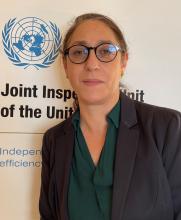
Interview of Inspector Carolina Fernández Opazo
Date: 20 January 2022
Please say a few words about "who you were" in your professional life before joining the JIU?
Before joining the Joint Inspection Unit, I held various positions within the Ministry of Foreign Affairs of my country, Mexico, all in the multilateral arena for around 25 years. Here, I served the Ministry in its administrative and budgetary affairs especially in the United Nations division. In the past 15 years, I assumed the functions of Director and then Coordinator for the planning and financial affairs in the Directorate General for the United Nations. I administered the budgetary, administrative and financial issues in the UN system, including Mexico’s membership to 246 other international organizations. In this function, I was responsible for the national position regarding financial and budgetary issues of at least 54 of such international organizations.
By joining the JIU, I look forward to a change in the nature of my work and the pace, as well as a positive change for me and my family.

The Joint Inspection Unit of the United Nations system elects its Chair and Vice-Chair for 2022 and adopts its programme of work
The Joint Inspection Unit (JIU) concluded the second part of its Winter Session on 11 January 2022. In the first part of the Winter Session, the Inspectors elected Inspector Gopinathan Achamkulangare (India) as Chair and Inspector Tesfa Alem Seyoum (Eritrea) as Vice-Chair of the Unit for 2022. The Unit also adopted its programme of work for 2022 which includes five system-wide projects and the review of management and administration in one of its participating organizations. The programme of work will be presented to the General Assembly at its first resumed seventy-sixth session this year.

